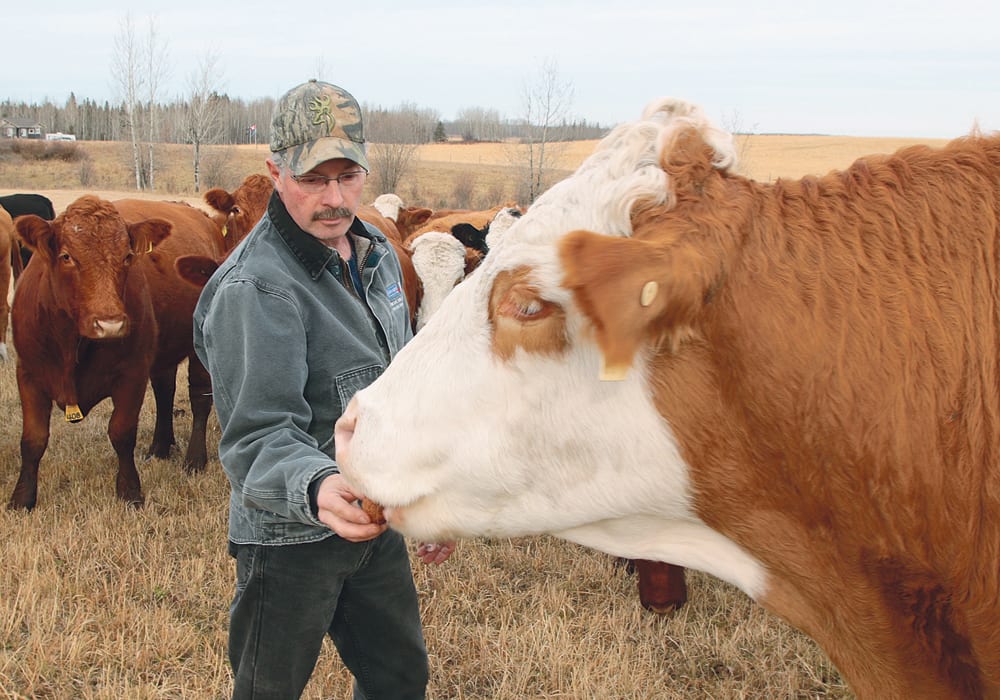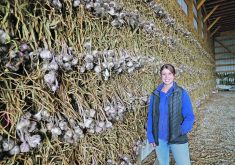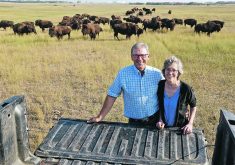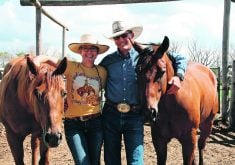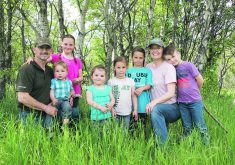On the Farm: The Sheltons have made significant improvements to their potato yields by properly managing their soil
LAC LA BICHE, Alta. — The Shelton family has managed to turn their once sandy soils into something rich and fertile, a testament to their ongoing commitment to improve the land.
The proof can be seen in the food they grow on their Sand Springs Ranch.
Their potatoes, once yielding 10 tonnes to the acre, now come up 20 to 24 tonnes per acre and have been as high as 32 tonnes.
As well, their garden vegetables read high on the Brix meter, a refractometer that measures sugar amounts in food. It shows their products are extremely nutritious.
“I’ve talked to conventional potato farmers, and sometimes they ask, ‘how can you even grow potatoes up there?’ I say, ‘it’s all we’ve ever done. It’s really nothing,’ ” said Janice Shelton, speaking alongside her family members around their kitchen table in Lac La Biche.
Ty and Janice took over the farm in 1984 from Janice’s parents. Their daughter, Jolene, works full-time, focusing on vegetable production, while their son, Tyler, works part-time but does much of the livestock work.

They raise cattle, finishing most on grass or sending some to the feedlot, as well as Berkshire pigs. They grow around 800 to 900 tonnes of potatoes per year and plant 20 acres of vegetables.
They still seed a little grain, but most acreage is for forages and pasture. They seed cocktail mixes of cabbage, kale, turnips, tillage radishes, oats and peas, later turning out the cattle onto it.
“It was originally mostly grain farming, working six months off the farm in the winter and six months on, but I realized my kids were growing up and I was missing a lot at home,” Ty said. “So we wanted to do something different so I could stay home.
“One of the neighbours was a potato farmer and we don’t have many rocks here, so we started growing potatoes and vegetables.”
Read Also

Rural Manitoba resources slim on natural disaster planning
A study from Brandon University’s Rural Development Institute has found that many rural and small municipalities don’t have the staff or resources to make formal climate plans against natural disaster.
The family farms everything organically, though they point out they’ve always done it that way because it was more affordable to do so.
Still, they believe in organic practices, putting lots of their effort into soil health. Better soils, Janice said, means better yields, fewer weeds and diseases, improved pastures and high-quality food.
“We’ll test this or that, and if it doesn’t meet standards, we’ll plow the crop under,” Ty said. “We don’t shove it to market. We want things to be high quality.”
Janice’s father, Raymond, recalled that when his family moved to the area in 1941, the soil was sandy and not so good.
“They’ve built it up to this point where it’s a quality soil, just from husbandry of the land.”
But even though better soils help their bottom line and improve quality, there are also other reasons for it.
They want to ensure the land is productive and sustainable for when their grandchildren potentially farm it one day. As well, ensuring their family eats healthy food is important.
“I think we really like to know what we’re growing and have a good understanding of how to grow it better,” Janice said. “We’ve learned all this stuff and we kind of like to think we’re at the beginning of where farming is going.”
Science has also played a role in the reasons behind their efforts.
Research has stated that grass-finished beef has an improved fatty acid profile, containing a better balance of omega 3 and omega 6 fatty acids. The better the balance, the better it is for human health.
For instance, Janice said grass-finished beef strives to have an omega 3-omega 6 ratio of 5:1 while commodity beef generally measures around 30:1.
The family had their beef tested by a researcher from the University of Toronto and it came back with a fatty acid ratio of three to one, an indication their product is performing well.
“When we’ve talked to scientists and they are saying we’re doing it right, that feels good,” Janice said. “We know we are doing it right.”
But like most farms, the family faces a unique set of challenges. They are located in Lac La Biche, about 230 kilometres north of Edmonton, which is a far drive for weekend farmers markets. As well, it’s been difficult to find enough labour for harvest.
To mitigate that, they plan to sell most of their products to wholesalers. One packer from Calgary will be taking their potatoes. As well, they’re looking into buying more machinery to improve harvest efficiency.
“It would allow us to effectively grow the crop and address all of those labour issues,” Janice said. “It’s been difficult to find people to work all the way up here. They want to be close to the city.”
Still she points out their problems could be worse. It’s not like their yields are low.
“The potatoes are yielding phenomenally; oh what a problem to have,” she said jokingly.


